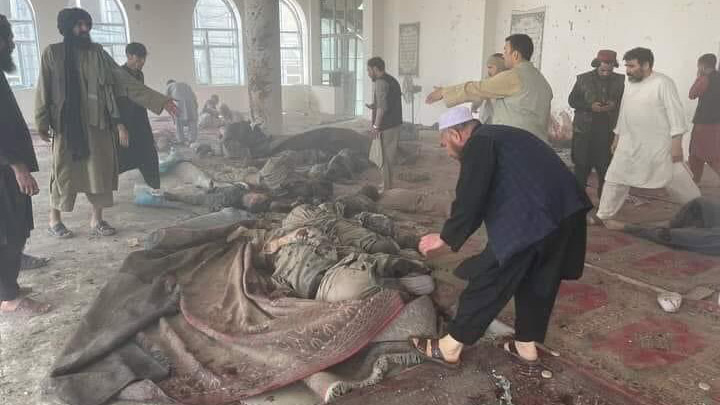Close to 30 people were killed and several injured in a massive explosion that targeted a Shia mosque in Afghanistan’s Mazar-e-Sharif, the capital of the northern Balkh province, on April 21. ISIS has taken the responsibility for the attack. Fear and anger has gripped the entire country. United Nation Special Rapporteur Richard Bennett has called for an immediate investigation and accountability for the systematic attacks on crowded schools and mosques.
“Blood and fear are everywhere across the streets of Afghanistan. People were seen screaming in pain and fear while seeking terrible news to their relatives in the nearby hospital,” one local told AFP. “The first and second line of the prayers were severely hit and only the people in the third and fourth lines were safe,” Idris Ahmad, another injured person, was quoted as saying by local media. As many as 400 worshipers were present inside the mosque at the time of explosion. The total number of casualties is expected to spike.
At least 25 people were confirmed dead, according to Zabihullah Noorani, head of Balkh province’s Taliban-run information and culture department. Several more are in a critical condition. The head of the provincial department of security, Mohammad Asif Waziri, stated that the bomb was planted inside the mosque. The pattern of target attacks has caused fear psychosis and concern within minority groups, including ethnic Hazaras, who have faced the brunt of violence inflicted by state and non-state actors during the country’s four decades of unrest.
On April 21, another blast caused at least 11 more casualties in Kunduz. Earlier this week, six people were killed in twin blasts that hit a boys’ school in West Kabul’s Shiite neighborhood Dasht-e-Barchi. “It is essential that the de facto authorities carry out a thorough investigation into the attacks, which should be conducted in line with international law and standards. Those suspected of criminal responsibility for these callous bombings must face justice in fair trials before ordinary civilian courts and without recourse to death penalty,” Amnesty International stated.
Tens of thousands of people from minority communities in Afghanistan, especially the ethnic Hazaras who are predominantly Shia Muslims living across the Kabul, Herat, Helmand, Ghazni, Balkh and Bamiyan provinces, have fled the war-torn country ever since the Taliban seized power on August 15, 2021.
Structural violence against the Hazaras has continued “in the form of kidnappings, suicide attacks, targeted killings and beheadings,” Amnesty said. In May 2021, at least 90 people, mostly students, were killed in three bomb blasts outside a girls’ school in the Dasht-e-Barchi area. Over 200 people were injured at that time, and the Taliban were accused of carrying out the attack.
Chairman of the Afghanistan Independent Human Rights Commission, Shaharzad Akbar, has previously reiterated that its assessment showed that the Shia and Hazara communities are victims of an ongoing genocide and that an international probe should be conducted to investigate the atrocities against them.





